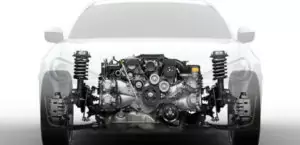The 1.8-liter Volkswagen ADZ 8v engine was produced by the concern from 1994 to 1999 and was installed on the third generation of the popular Golf, Passat B4 and a number of cars from Seat. This mono-injection power unit is essentially an updated version of the ABS motor.
The EA827 1.8l series includes: RP, AAM, ABS, ADZ, PF, ADR, ARG, AEB, ANB.
Specifications
| Production years | 1994-1999 |
| Displacement, cc | 1781 |
| Fuel system | single injection |
| Power output, hp | 90 |
| Torque output, Nm | 145 |
| Cylinder block | cast iron R4 |
| Block head | aluminum 8v |
| Cylinder bore, mm | 81 |
| Piston stroke, mm | 86.4 |
| Compression ratio | 10.0 |
| Features | SOHC |
| Hydraulic lifters | yes |
| Timing drive | belt |
| Phase regulator | no |
| Turbocharging | no |
| Recommended engine oil | 5W-40 |
| Engine oil capacity, liter | 3.8 |
| Fuel type | petrol |
| Euro standards | EURO 1 |
| Fuel consumption, L/100 km (for VW Passat B4 1995) — city — highway — combined |
10.7 6.5 8.0 |
| Engine lifespan, km | ~320 000 |
The engine was installed on:
- Volkswagen Golf 3 (1H) in 1994 – 1999;
- Volkswagen Passat B4 (3A) in 1994 – 1996;
- Volkswagen Polo 3 (6N) in 1997 – 1999;
- Volkswagen Vento 1 (1H) in 1994 – 1998;
- Seat Cordoba 1 (6K) in 1994 – 1999;
- Seat Ibiza 2 (6K) in 1994 – 1996;
- Seat Toledo 1 (1L) in 1994 – 1999.
Disadvantages of the VW ADZ engine
- The main problems for owners are caused by failures in the operation of the mono-injection system.
- Regularly here you have to deal with leaks of lubricant or coolant.
- Due to throttle contamination or air leaks, engine speed often floats.
- More often than others, the lambda probe and the antifreeze temperature sensor fail here.
- By 200,000 km, rings or caps usually wear out and oil consumption appears.






